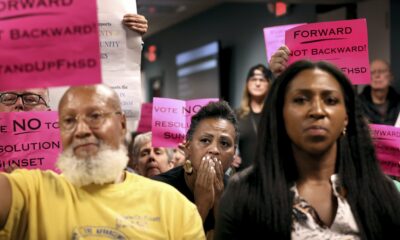Latest News
A Hopeful Way Out of Our Dismal Economics
Author Nick Romeo lays out a plan for an economy that puts workers and the planet above profits.

There is little dispute that this century has so far been one of widening inequality, environmental peril and degrading standards for workers. The disputes are less about the existence of those conditions than about what can be done about them. In those debates, our current view of economics has been largely off-limits.
Because economics is widely accepted as a scientific discipline, key concepts are thought of as laws that need not be questioned: Markets are more efficient at distributing resources than public decisions, inequality is an inevitable side effect of growth, and the sum of individuals making rational, self-interested decisions adds up to more benefit for all.
Journalist Nick Romeo reminds us in his new book that this consensus view of economics achieved dominance in the second half of the last century and was promoted by industrialists. It was not until 1968 that the Nobel Prize for “Economic Sciences” was added (the prizes began in 1901), funded by the Bank of Sweden.
In the scientific view of economics, the economy is not always framed as a place of moral action and accountability. The Alternative: How to Build a Just Economy presents actions that reject some dominant presumptions of economics. Romeo briefly lays out how those “laws” of economics are really elevated myths that constrain what we think is possible.
Romeo then provides models of what might be called “purpose-driven economics,” in which people and institutions are motivated by moral goals as much as profit incentives. Examples include publicly guaranteed jobs in Austria, employee stock ownership plans in the United States, and local efforts in Canada and the U.S. to create publicly owned app platforms to compete with companies like Uber and DoorDash (so that a greater share of earnings could go to workers).
In an interview with Capital & Main, Romeo shared his views on how we can imagine a better future by rejecting the most dismal elements of “economic science.” “There are so many critiques of neoliberalism out there, my hope for the book is to create alternatives,” he said.
Capital & Main: How do the tenets of today’s mainstream economics drive poverty, environmental harm and inequality?
Nick Romeo: A dogmatic belief in private market superiority has all kinds of undesirable impacts. If private markets always do things faster and better, why invest in public options, whether that’s transportation, health care, child care, education or anything else? And if any redistribution will necessarily harm economic growth, you can argue that progressive taxation actually harms the poor. The case against any kind of environmental regulations is similar: If we actually make companies pay for their pollution, or better yet, make it illegal in the first place, this will just hurt growth and kill jobs. There’s a lot of evidence that none of these claims is very plausible and the reality is much more nuanced and complex. But these are kind of zombie views — they just keep stumbling around, undead.
If these tenets are really myths, what are some actions that could offset the harm created by these myths?
So that’s kind of the rest of the book! The first chapter gets into the battle within academia for the heart of the economics 101 class — what gets taught and how and why. But after that, I present a set of reported case studies and stories of compelling models: things like participatory budgeting, worker-owned cooperatives, job guarantees, true pricing, new corporate ownership and capital investment models, a public option for irregular labor markets, and an expanded definition of living wages. So the argument is: these compelling alternative models exist, but they are not yet appreciated or championed by enough people.
How is the prohibitive cost of housing in many cities the result of our current economic thinking? What is an alternative?
Treating housing as just another asset class for investors rather than a public good is one key factor. Anyone who reads about affordable housing policy in Vienna, Austria, will see a very interesting example of just how differently things might have turned out in America. Given where we are in America, there are still various options: Some tenants are exploring forming unions to bargain collectively with landlords; more states and municipalities are banning no-fault evictions as well. One model that I explore in the book uses legal trusts to try to create permanently affordable housing in cities around the country. So basically they create a portfolio of housing owned by a trust, the purpose of which is co-authored by residents in these neighborhoods, and which typically includes things like keeping housing permanently affordable and buying out predatory landlords.
One area you explore in your book is increasing worker ownership of companies. Has that worked well, and what could enable more employee-owned businesses?
Worker ownership does work well — there’s research showing that employee ownership models outperform standard models in helping workers build wealth while also decreasing turnover and promoting the longevity and profitability of businesses. It’s also a relatively bipartisan issue. California’s Employee Ownership Act, which passed unanimously in 2022, is meant to educate and help business owners transition to worker ownership models. The nonprofit Project Equity estimates that there are about 350,000 business owners in California nearing retirement. So we’re talking about millions of workers, and that’s just in one state. Enabling that many people to own equity in the businesses where they help to create value could have real impacts on American wealth inequality. Many other states are doing similar things, and some recent federal legislation — the WORK Act — is pushing in this direction as well.
Those who take the kinds of actions you describe are portrayed as exceptional. How can acts like these become normalized?
Great question. It’s natural to want to celebrate a business owner who pays genuine living wages to people cleaning houses, or a retiring CEO who places their company into a purpose trust so that it can share profits with workers in perpetuity. And statistically, these people are exceptions. But as long as we think of them as rare moral saints, this sort of lets everyone else continue with the status quo. So one part of this is seeing people who behave well in a business context as admirable, without somehow treating them as such shocking aberrations that we actually just normalize the bad behavior of everyone else. So culture and expectations are important, but legal and regulatory tools can also simply set a new standard for what’s acceptable, whether that’s how you compensate your employees, how you calculate your impacts on the natural world, or how you structure ownership and succession.
What are some legal and regulatory tools that might lead to those behavioral and cultural changes?
One basic policy change would be to set the federal minimum wage at a level that’s roughly at what we currently call living wages. As I explore in the book, what are called living wages in America often do not really let people live: They still struggle to afford all sorts of normal life expenses, let alone save for retirement, children’s education, gifts for loved ones or any sort of vacation. That’s not what most people mean by the word “living,” yet it’s still far above the federal minimum wage of $7.25, last raised in 2009.
Another policy idea that I explore is a job guarantee, perhaps federally funded and locally administered. One trendy prediction is that AI will eliminate huge numbers of jobs in the future. If, say, a quarter of the American workforce could not find jobs, a federal job guarantee could become popular very fast. Even if these predictions of worker displacement by AI have been overstated, as some excellent economists suspect, a large-scale job guarantee still has several compelling features: When the jobs are meaningful and suit people’s interests and skills, work can be an important source of self-esteem, community and purpose. Mobilizing large numbers of people to do jobs that tackle vitally important infrastructure projects, care work and green transition work could also fill vital needs that the private market has largely failed to address.
Copyright 2024 Capital & Main
-

 California UncoveredApril 9, 2024
California UncoveredApril 9, 2024700,000 Undocumented Californians Recently Became Eligible for Medi-Cal. Many May Be Afraid to Sign Up.
-

 Feet to the FireApril 22, 2024
Feet to the FireApril 22, 2024Regional U.S. Banks Sharply Expand Lending to Oil and Gas Projects
-

 Class WarMarch 26, 2024
Class WarMarch 26, 2024‘They Don’t Want to Teach Black History’
-

 Latest NewsApril 10, 2024
Latest NewsApril 10, 2024The Transatlantic Battle to Stop Methane Gas Exports From South Texas
-

 Latest NewsApril 23, 2024
Latest NewsApril 23, 2024A Whole-Person Approach to Combating Homelessness
-

 Latest NewsMarch 27, 2024
Latest NewsMarch 27, 2024Street Artists Say Graffiti on Abandoned L.A. High-Rises Is Disruptive, Divisive Art
-

 State of InequalityApril 11, 2024
State of InequalityApril 11, 2024Dispelling the Stereotypes About California’s Low-Wage Workers
-

 Latest NewsApril 24, 2024
Latest NewsApril 24, 2024An Author Reflects on the Effort to Rebuild L.A. After the ‘Violent Spring’ of 1992




















